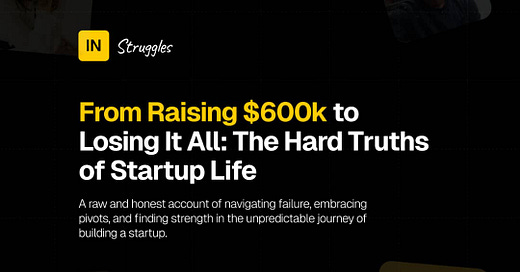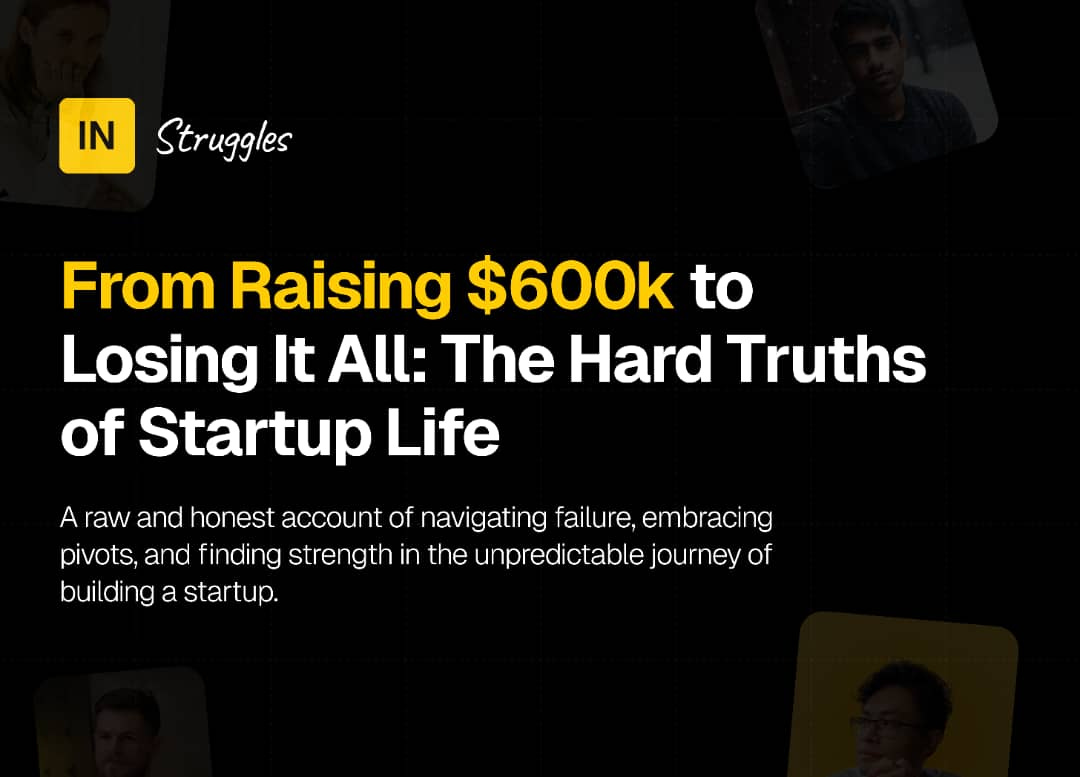From Raising $600k to Losing It All: The Hard Truths of Startup Life
A raw and honest account of navigating failure, embracing pivots, and finding strength in the unpredictable journey of building a startup.
👋 Hello, Idris here! Welcome to this week's Indieniche newsletter. Each week, I feature tips and stories from successful self-made founders, share insights on building great products, talk about growing your business, and showcase essential tools to help you build and scale better.
If you've found this newsletter helpful, please spread the word to your friends and consider subscribing if you haven't yet.
Today's interview is a bit different from what you're used to.
At Indieniche, we're all about honesty and sharing the raw realities of building and growing as founders. Success stories inspire us, but it’s the struggles, pivots, and failures that teach us the most.
In this edition, we feature Aleksa, a founder who’s seen the full spectrum of startup life, from raising a $600k pre-seed to filing for liquidation. Through multiple pivots, tough lessons, and intense moments of self-reflection, Aleksa has come out the other side with more confidence and clarity than ever.
This is a story of resilience, learning, and what it means to embrace failure as part of the journey.
In this interview, Aleksa shares:
His journey into the entrepreneurial space
The difficult decisions he faced as a founder
His experience with imposter syndrome and moments of fear
The advice he'd offer to entrepreneurs who are just starting out.
Q. Tell us a little about yourself and your journey into the entrepreneurial space.
Hi everyone, I’m Aleksa! My background is in B2B sales at SaaS and FinTech companies.
About three years ago, I co-founded a tech startup with a friend. Fast forward to today, and we’re filing for liquidation. Along the way, we raised a VC round, hired people, fired people, pivoted three times, landed paying customers, and tried to raise more money. When our results didn’t support an external round, even our existing investors hesitated. That’s when we knew it was time to call it.
It might sound strange, but despite the situation, I’ve never felt more confident or content with myself.
Q. What were the major iterations of your startup, and what did you learn from them?
2021: The Onboarding Solution
We started during the second wave of COVID when remote work was booming, and everyone was talking about “the future of work.” A lot of people in our circles pointed us toward solving onboarding issues for new hires. We were excited, got verbal commitments, and started building and fundraising.
We raised $600k pre-seed with nothing but a deck (2021 was a wild time for funding). But when we launched, we noticed something that killed us: HR teams loved the idea but didn’t want to own the process. They passed us off to managers, who sent us back to HR. It was like a game of ping-pong. And with the layoffs starting in 2022, it was clear this wasn’t going to work.
Iteration 1: Onboarding for Marketplace Suppliers
We shifted to marketplaces, focusing on simplifying supplier onboarding (think Airbnb hosts or Uber drivers). What took them 2-3 weeks, we cut down to two minutes. It was great in theory, but companies weren’t interested. One Uber exec outright told me they’d never outsource something so critical to their operations.
Iteration 2: Compliance Onboarding for Blue-Collar Recruitment
This came from a big marketplace that needed to verify things like work eligibility, payroll, and agreement signing. We got close to a deal, but selling to a big company backfired. Within four months, 10 of our contacts were fired or left, so every time we gained momentum, we were back to square one.
We kept pushing in this direction, but the truth is, compliance was more about checking a box than genuinely solving a problem. Most providers we spoke to weren’t even compliant themselves.
Iteration 3: User Analytics for PLG SaaS Companies
This was a big shift. Instead of building based on feedback, we focused on revenue. We started with an MVP built entirely in Google Sheets. Companies wanted to enrich their user data (e.g., turning an email into actionable insights) and identify who was closest to converting. We did the processing manually, sent it back in 2-3 days, and charged for the service.
We had 10 paying customers, some even paying $1k per job. Eventually, we started building a recurring product and grew to $500 MRR in the first month. By the time we hit six customers, though, we realized we needed more resources to scale. I was the only one doing sales, and my co-founders handled all the development. That’s when we hit a wall.
Q. Have you ever launched a product that completely flopped? What did you learn?
Yes, plenty of times! The most recent one was a tough ride, but I learned a lot:
Build for people whose speed, values, and curiosity match yours (for me, that’s marketing, sales, and dev teams).
Only build products where you’d be the first paying customer. Eat your own dog food.
Revenue > feedback. Focus on what people will actually pay for.
Start with a Minimum Sellable Setup (MSS), not an MVP. Just worry about getting your first dollar.
If your product isn’t easy to set up and use, it won’t fly, especially early on.
Stick with small service providers for legal/accounting. Big firms won’t care about you until you’re bigger.
Q. What’s been the most difficult decision you’ve faced as a founder?
Each pivot, hands down. Going from 0 to 1 on a new idea is a mix of science, art, and a bit of mystery.
Q. What sacrifices have you made for your startup, and do you think they were worth it?
Where do I even start? My salary was 20-30% of what I could’ve earned working a regular job. I stopped my hobbies. As an immigrant, I was downgraded to a visa based on my lower income. I put off learning the local language. I haven’t had a proper vacation in four years. And I’ve had to restrict myself from a lot of comforts to stay focused on work.
Q. Have you experienced imposter syndrome or moments of fear? How did you deal with them?
Imposter syndrome? Almost daily.
But there was one moment of real fear. We had 0 customers and no money coming in, and as a salesperson, that’s like mental torture. I had a bit of a breakdown, writing frantically on paper everything I’ve ever achieved just to remind myself who I was. After a while, it passed, and thankfully, it never happened again.
Q. Was there ever a point when you thought about giving up? What kept you going?
Never. I love challenges, I trust my skills, and I want to make a lasting impact.
Q. If you could give one piece of advice to founders about handling failure, what would it be?
Just keep pushing.
Thank you for taking the time to answer these questions! What is your contact info if people would like to get in touch with you? You can add all your links.
Feel free to connect with me on X
Indie Tip Of The Week
This week's indie tip is about leveraging Reddit for leads and SEO. Start by engaging with high-ranking subreddits and analyzing content gaps. Focus on top threads, contribute valuable comments, and add links to your profile. By supporting discussions and sharing helpful content, you position yourself within trending topics, driving organic traffic and building SEO authority.
Indie Product Of The Week
Boost your small website’s ranking with The SEO Corner! We specialize in providing high-quality backlinks tailored to help new and growing websites thrive in competitive search results. Say goodbye to generic links and hello to custom tailored strategies designed for your niche. Watch your site’s visibility soar with our trusted and proven link-building services.
Check out the product, and share your thoughts in the comments!
Indie Trivia Of The Week
What 1988 book by Salman Rushdie is considered blasphemous by many Muslim countries?
Share Your Product With Indie Niche Users
Do you have a product you'd like to share with our community of over 1,000+ indie niche founders?
Drop us a line detailing what makes your product stand out, whether it's a SaaS, marketplace, app, newsletter, or anything else innovative. We're eager to hear from you!
We will pick a product to feature in next week’s newsletter. Thanks for sharing and looking forward to hearing from you.









